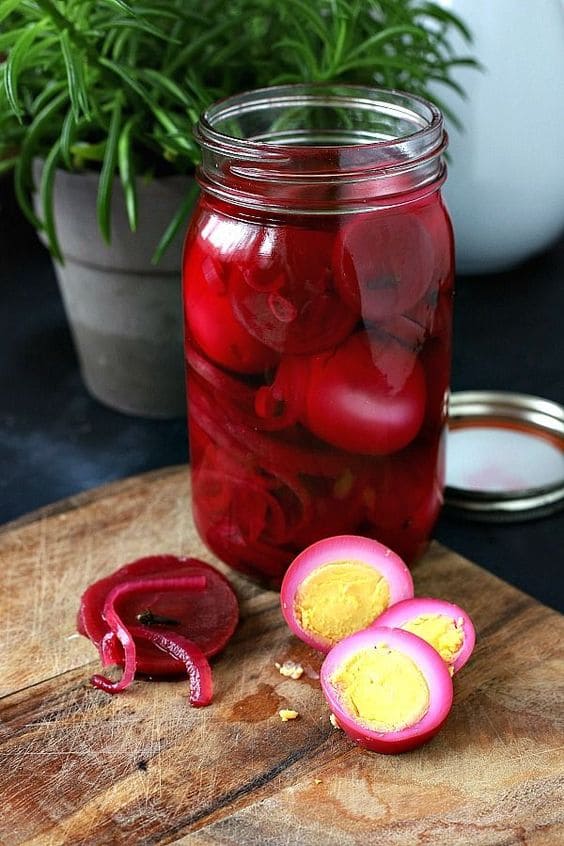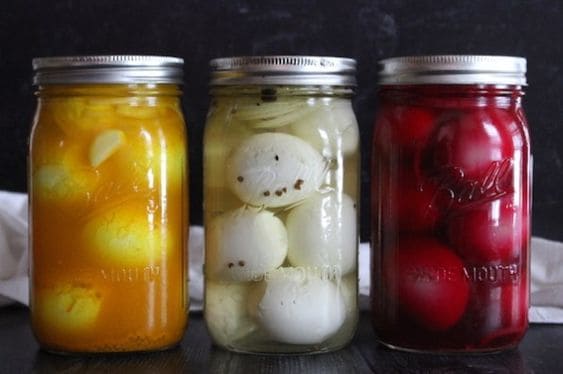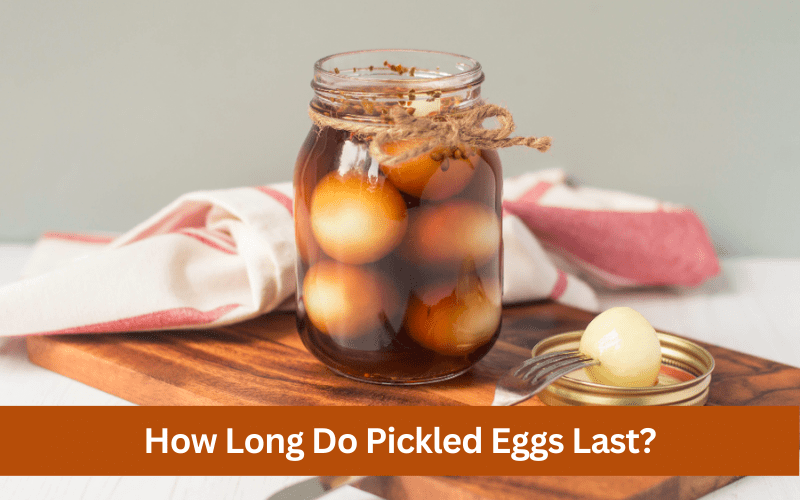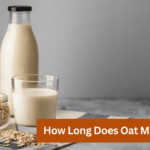If you’re a fan of pickled eggs like I am, you’ve probably asked yourself at some point, how long do pickled eggs last? There’s nothing worse than reaching for a delicious pickled egg snack only to find that it’s past its prime. As someone who has experienced the disappointment of spoiled pickled eggs, I understand the importance of knowing how to properly store and preserve them. In this article, we’ll explore everything you need to know about the shelf life of pickled eggs, how to store them, and even how to make your own at home. So, let’s dive in and ensure that we can enjoy pickled eggs for as long as possible!
What Are Pickled Eggs?
Pickled eggs are exactly what they sound like – eggs that have been preserved in a mixture of vinegar, salt, and other spices or seasonings. They’re a popular snack food that can be found in many bars, pubs, and delis across the world, and they come in a variety of flavors and colors.
Pickled eggs are typically made by hard-boiling eggs and then peeling them. The peeled eggs are then placed in a container, such as a jar, and covered with a mixture of vinegar, salt, sugar, and spices. The eggs absorb the flavors of the mixture over time, resulting in a tangy, savory snack that’s perfect for a quick bite or as part of a larger meal.
Different Types of Vinegar for Pickling Eggs
There are several types of vinegar that can be used for pickling eggs, each of which will create a slightly different flavor profile. Here are some of the most popular types of vinegar used for pickling eggs:
- White vinegar: This is the most common type of vinegar used for pickling eggs. It has a sharp, clean taste that works well with the flavors of the pickling spices.
- Apple cider vinegar: This vinegar has a milder flavor than white vinegar and can add a slightly fruity note to the pickled eggs.
- Rice vinegar: This vinegar is popular in Asian cuisine and has a mild, slightly sweet flavor that can add a unique twist to pickled eggs.
- Red wine vinegar: This vinegar has a rich, tangy flavor that can add depth to the pickled eggs.
- Balsamic vinegar: This vinegar has a sweet, fruity flavor that can add a unique twist to pickled eggs. However, it can also darken the color of the eggs, so it may not be the best choice for those looking to make bright, colorful pickled eggs.
- Malt vinegar: This vinegar is made from malted barley and has a distinctive, tangy flavor that can add a unique twist to pickled eggs.
Overall, the type of vinegar used for pickling eggs comes down to personal preference. Some people prefer the sharpness of white vinegar, while others enjoy the milder flavors of apple cider vinegar or rice vinegar. Experimenting with different types of vinegar can lead to new and exciting flavor combinations in your pickled eggs.
What Do Pickled Eggs Taste Like?
Pickled eggs have a unique flavor that’s hard to describe – they’re tangy, savory, and slightly salty all at once. The taste of pickled eggs depends on the type of vinegar and spices used in the pickling process.
Some pickled eggs are quite tart and vinegary, while others are sweeter or more savory. The spices used in pickling can also add a range of flavors to the eggs. Mustard, dill, and garlic are common spices used in pickling, and each can add a distinctive flavor to the eggs.
The texture of pickled eggs is also unique. The egg whites become firm and slightly rubbery, while the yolks become creamy and soft. The texture of the yolk can vary depending on how long the eggs are pickled – shorter pickling times will result in softer yolks, while longer pickling times will result in firmer, more crumbly yolks.
How Are Pickled Eggs Made?
Pickled eggs are surprisingly easy to make and require only a few simple ingredients. Here’s everything you need to know to make your own pickled eggs at home:
Ingredients of pickled eggs
- 1 dozen large eggs
- 2 cups of vinegar (white vinegar is the most common)
- 1 cup of water
- 1 tablespoon of salt
- 1 tablespoon of sugar
- Pickling spices (optional)
Preparation of eggs for pickling
Before you can pickle the eggs, you’ll need to hard-boil them. Here’s how to do it:
- Place the eggs in a large pot and cover them with cold water.
- Place the pot on the stove and bring the water to a boil.
- Once the water is boiling, remove the pot from the heat and cover it with a lid.
- Let the eggs sit in the hot water for 10-12 minutes.
- Remove the eggs from the hot water and place them in a bowl of ice water to cool.
Once the eggs are cooled, it’s time to peel them. Gently tap each egg on a hard surface to crack the shell, then peel the shell away from the egg.
Step-by-step instructions for pickling eggs
- In a large pot, combine the vinegar, water, salt, sugar, and any pickling spices you’d like to use. Bring the mixture to a boil and stir to dissolve the salt and sugar.
- Once the mixture is boiling, reduce the heat to low and let it simmer for a few minutes.
- Place the peeled eggs into a clean glass jar or container. Make sure the container is large enough to hold all of the eggs and the pickling liquid.
- Pour the pickling liquid over the eggs, making sure they are completely covered.
- Seal the container tightly and place it in the refrigerator.
- Let the eggs pickle for at least 24 hours before eating. The longer they pickle, the stronger the flavor will be.
Tips for pickling eggs
- Use a large, wide-mouthed jar or container to make it easier to get the eggs in and out.
- Experiment with different pickling spices to find the flavor you like best.
- Make sure the eggs are completely covered with the pickling liquid to prevent spoilage.
- For a brighter color, add a small amount of beet juice to the pickling liquid.
- Don’t eat pickled eggs that have an off odor or appear slimy or discolored.
Overall, making pickled eggs at home is a fun and easy process that can result in a delicious and unique snack. With just a few simple ingredients and some basic kitchen equipment, you can enjoy pickled eggs anytime you like.
Common Mistakes in Making Pickled Eggs
While making pickled eggs is a simple process, there are a few common mistakes that can ruin the flavor or even make the eggs unsafe to eat. Here are some of the most common mistakes to avoid when making pickled eggs:
- Not using the right type of vinegar: The acidity of the vinegar is what helps preserve the eggs, so it’s important to use a vinegar with a high enough acidity. White vinegar is the most commonly used vinegar for pickling eggs, as it has a high acidity level.
- Overcooking the eggs: Overcooked eggs can become rubbery and tough, which can affect the texture of the pickled eggs. Be sure to follow the instructions for hard-boiling the eggs carefully, and avoid overcooking them.
- Using eggs that are too fresh: Fresh eggs can be difficult to peel, which can make the pickling process more difficult. It’s best to use eggs that are a few days old for pickling.
- Not sterilizing the jar or container: It’s important to use a clean, sterilized jar or container for pickling the eggs. This helps prevent bacteria from growing and spoiling the eggs. To sterilize the jar or container, run it through the dishwasher or rinse it with boiling water.
- Not letting the eggs pickle long enough: Pickled eggs need time to absorb the flavors of the pickling liquid, so it’s important to let them pickle for at least 24 hours before eating. The longer the eggs pickle, the stronger the flavor will be.
- Using too much salt or sugar: The pickling liquid should be balanced and not overly salty or sweet. Be sure to measure the salt and sugar carefully, and adjust the amounts to suit your taste.
- Not storing the pickled eggs properly: Pickled eggs should be stored in the refrigerator at all times, and should be consumed within a few weeks of pickling. If the eggs appear slimy, discolored, or have an off odor, they should be discarded immediately.
Avoiding these common mistakes will help ensure that your pickled eggs are safe to eat and have a delicious flavor. With a little practice and experimentation, you can create your own unique pickled egg recipe that you’ll love.
Shelf Life of Pickled Eggs
Pickled eggs can last for a surprisingly long time, but their shelf life depends on several factors. Here’s what you need to know about the shelf life of pickled eggs:
Factors that affect the shelf life of pickled eggs
Several factors can affect the shelf life of pickled eggs, including:
- The acidity of the pickling liquid: The acidity of the pickling liquid is what helps preserve the eggs. Vinegar has a high acidity level, which makes it an ideal ingredient for pickling. The higher the acidity of the pickling liquid, the longer the eggs will last.
- The storage temperature: Pickled eggs should be stored in the refrigerator at all times. The cooler the temperature, the longer the eggs will last.
- The cleanliness of the container: The container used to store the pickled eggs should be clean and free from any bacteria. If the container is dirty, bacteria can grow and spoil the eggs.
- The freshness of the eggs: Fresh eggs are more likely to spoil than older eggs. Be sure to use eggs that are a few days old for pickling.

Do pickled eggs need to be refrigerated?
Yes, pickled eggs should be refrigerated at all times. This helps prevent the growth of bacteria that can spoil the eggs. If pickled eggs are left at room temperature for too long, they can become unsafe to eat.
How long do pickled eggs last in the refrigerator?
Many cooking lovers wonder how long will pickled eggs last in the refrigerator? To ensure the best quality and safety, it is important to keep pickled eggs refrigerated at all times. Small eggs may only need 1 to 2 weeks for proper seasoning to occur, while medium or large eggs can take 2 to 4 weeks. It is recommended to consume pickled eggs within 3 to 4 months of pickling for the best quality. After this time, the texture and flavor may start to deteriorate, making the eggs less enjoyable to eat. By following these guidelines, you can ensure that your pickled eggs are safe and delicious for as long as possible.
How long do pickled eggs last unrefrigerated?
It is important to never leave pickled eggs at room temperature for an extended period of time, except for serving time. So, how long do pickled eggs last at room temperature?
When serving pickled eggs, they should not be left out of refrigeration for more than 2 hours in the temperature danger zone of 40 to 140 degrees F. This helps prevent the growth of harmful bacteria that can cause foodborne illnesses. It’s essential to note that pickled eggs that are stored at room temperature for extended periods of time have been known to cause botulism, a severe form of food poisoning that can be life-threatening.
Therefore, it is crucial to always store pickled eggs in the refrigerator to ensure their safety and to discard any eggs that have been left out at room temperature for more than 2 hours.
Do pickled eggs have an expiration date?
The shelf life of pickled eggs can vary, depending on factors such as how they were prepared and how they are being stored. Properly stored pickled eggs can last for several weeks up to 4 months in the refrigerator.
It’s worth noting that store-bought pickled eggs usually have a “use by” or “best before” date on the packaging, which indicates the recommended timeframe for consumption.
However, the actual shelf life of homemade pickled eggs may vary, so it’s best to monitor their texture and flavor regularly and discard any eggs that appear slimy, discolored, or have an off odor. By properly storing and monitoring your pickled eggs, you can enjoy them safely and deliciously for weeks or even months.
Explore: How Long Is Chinese Food Good For? A Guide To Shelf Life And Proper Storage
Can Pickled Eggs Go Bad?
Pickled eggs can be a delicious and unique snack, but like any food, they can go bad if not stored properly. Here’s what you need to know about the signs of spoiled pickled eggs and what can happen if you eat them:
Signs of spoiled pickled eggs
- Slimy texture: If the pickled eggs have a slimy texture, it’s a sign that bacteria may be growing on them. This can make them unsafe to eat.
- Discoloration: If the pickled eggs have an unusual color or appear discolored, it may be a sign of spoilage.
- Off odor: If the pickled eggs have an off odor or smell sour or rotten, they should be discarded immediately.
- Cloudy pickling liquid: If the liquid surrounding the pickled eggs appears cloudy or has an unusual odor, it may be a sign of spoilage.
What happens if you eat bad pickled eggs?
Eating spoiled pickled eggs can cause food poisoning, which can lead to a range of unpleasant symptoms. These may include:
- Nausea and vomiting
- Diarrhea
- Stomach cramps
- Headaches
- Fatigue
In severe cases, food poisoning can even be life-threatening. It’s essential to monitor your pickled eggs closely and discard any that show signs of spoilage. If you suspect that you may have eaten spoiled pickled eggs and experience any of the symptoms listed above, seek medical attention immediately.
Preserving Pickled Eggs

Preserving pickled eggs is all about proper storage and handling. Here’s what you need to know to keep your pickled eggs fresh and delicious for as long as possible:
How to store pickled eggs
The best way to store pickled eggs is in the refrigerator. Be sure to store them in an airtight container or jar, and keep them away from any raw meat or other potentially contaminating foods.
Tips for extending the shelf life of pickled eggs
To extend the shelf life of pickled eggs, here are some tips to follow:
- Always use clean, sterilized jars or containers for pickling and storage.
- Store the eggs in the refrigerator at all times, and be sure to consume them within their recommended shelf life.
- Don’t store pickled eggs at room temperature for extended periods of time, as this can increase the risk of spoilage and foodborne illness.
- Regularly inspect the eggs for signs of spoilage, and discard any that appear slimy, discolored, or have an off odor.
- Use the freshest eggs possible for pickling, and be sure to hard-boil them properly before pickling.
Can you freeze pickled eggs?
While it’s technically possible to freeze pickled eggs, it’s not recommended. The freezing process can affect the texture and flavor of the eggs, making them less enjoyable to eat. Additionally, the freezing process can cause the eggs to expand, which can lead to the container breaking and creating a mess in the freezer.
The effects of freezing pickled eggs
If you do decide to freeze pickled eggs, be aware that the texture and flavor may be affected. Freezing can cause the eggs to become rubbery and tough, which can be unappealing. Additionally, the pickling liquid may become cloudy or separate during the freezing process, which can affect the overall flavor of the eggs.
Health and Safety Concerns
It’s necessary to be aware of the health and safety concerns associated with their consumption. Here’s what you need to know:
Health benefits and risks of eating pickled eggs
Pickled eggs can provide some health benefits, such as:
- Protein: Eggs are a good source of protein, which is essential for building and repairing tissues in the body.
- Vitamins and minerals: Eggs are also a good source of vitamins and minerals, including vitamin D, vitamin B12, and selenium.
However, it’s worth noting that pickled eggs can also be high in sodium, which can be a concern for people with high blood pressure or other health conditions.
Risks of consuming expired or spoiled pickled eggs
Expired or spoiled pickled eggs can pose several health risks, including:
- Foodborne illness: Eating expired or spoiled pickled eggs can lead to food poisoning, which can cause symptoms such as nausea, vomiting, diarrhea, and stomach cramps.
- Botulism: Home-pickled eggs that have been stored at room temperature for extended periods of time can be a breeding ground for the bacteria that cause botulism. Botulism can be a severe form of food poisoning that can cause paralysis or even be life-threatening.
Ways to Use Pickled Eggs
Pickled eggs can be a versatile ingredient that can be used in a variety of ways. Let’s explore some creative and delicious ways to use pickled eggs:
Popular ways to serve pickled eggs
- As a snack: Pickled eggs can be enjoyed as a snack on their own, with a sprinkle of salt or pepper.
- On a salad: Add pickled eggs to a green salad for a tangy and protein-packed addition.
- In a sandwich: Sliced pickled eggs can add a unique twist to a sandwich, especially when paired with deli meats or cheese.
Creative ways to use pickled eggs in recipes
- Deviled eggs: Use pickled eggs instead of fresh eggs to make deviled eggs for a tangy twist on a classic appetizer.
- Potato salad: Add chopped pickled eggs to your favorite potato salad recipe for a tangy and protein-packed addition.
- Tacos: Use pickled eggs as a topping for tacos or burritos, along with other traditional toppings like cheese, lettuce, and sour cream.
Tips for pairing pickled eggs with other foods and drinks
- Beer: Pickled eggs can be a great pairing with beer, especially lighter beers like pilsners or lagers.
- Cheese: Pair pickled eggs with a variety of cheeses, such as cheddar or gouda, for a unique flavor combination.
- Mustard: Use mustard as a dipping sauce for pickled eggs to enhance the tangy flavor.
FAQs
How long do pickled quail eggs last?
Pickled quail eggs can last for several weeks to a few months if stored properly in the refrigerator. The actual shelf life will depend on the pickling recipe used and how the eggs are being stored. It’s important to monitor the texture, color, and odor of the eggs regularly and discard any that show signs of spoilage.
Can you reuse the pickling brine?
It’s not recommended to reuse the pickling brine for food safety reasons. The pickling brine may contain harmful bacteria from the first batch of eggs, which can grow and cause spoilage if reused. It’s best to make fresh pickling brine for each batch of eggs.
Can you make pickled eggs with other types of eggs?
Yes, pickled eggs can be made with other types of eggs such as quail eggs or duck eggs. However, the size and cooking time may need to be adjusted accordingly.
How long do pickled eggs last homemade compared to store-bought ones?
Homemade pickled eggs can last for several weeks to a few months if stored properly in the refrigerator. Store-bought pickled eggs usually have a “use by” or “best before” date on the packaging, which indicates the recommended timeframe for consumption.
How long do pickled eggs last if canned?
Pickled eggs are typically preserved in a pickling liquid that contains vinegar, which helps to extend their shelf life. Properly pickled eggs can last for several weeks to a few months if stored properly in the refrigerator. The exact shelf life will depend on factors such as how they were prepared and how they are being stored.
Conclusion
As a result, how long do pickled eggs last? The answer is that pickled eggs can last for several weeks to a few months, depending on how they are prepared and stored. It is important to properly store pickled eggs in the refrigerator and to check for any signs of spoilage before consuming them. With proper storage and handling, pickled eggs can be a tasty and healthy snack or addition to a meal. So go ahead and enjoy those pickled eggs, just be sure to keep them fresh and safe to eat!





